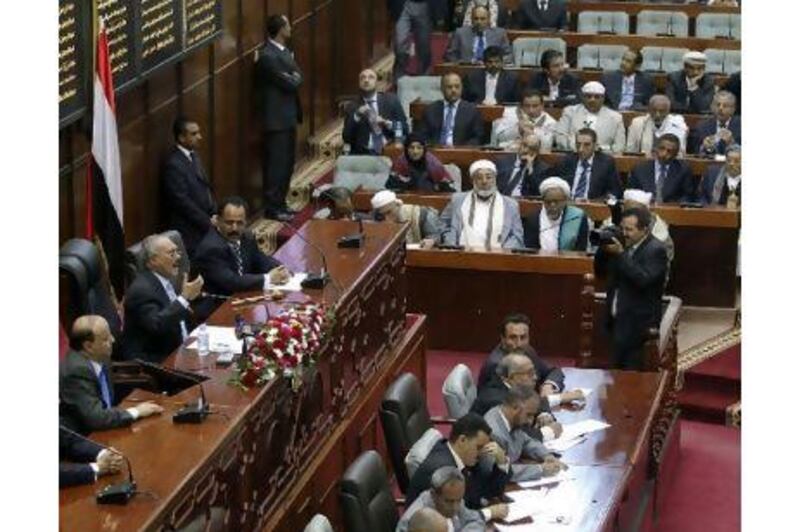SANA'A //In an apparent attempt to placate rising tensions and street protests, the Yemeni president Ali Abdullah Saleh yesterday told parliament he would withdraw constitutional amendments that would allow him to seek another term.
"I won't seek to extend my presidency for another term or have my son inherit it," Mr Saleh told the parliament. "No extension, no [power] succession, no resetting the clock."
Mr Saleh, 68, who has been in power for nearly 32 years, spoke to legislators in both houses of the assembly on the eve of rallies that the opposition had called for today in all Yemeni provinces. "I will not be stubborn. I will present these concessions in the interests of the country," he said. "The interests of the country come before our personal interests."
Yemen's parliament last month gave preliminary approval to a constitutional reform package that would allow Mr Saleh to stay in power past 2013.
Mr Saleh yesterday reiterated his call to the Joint Meeting Parties (JMP), an opposition coalition of six parties, to return to dialogue with his party. He also ordered the official voters' register to accommodate new voters, a step he said would lead to the postponement of the parliamentary election that was scheduled for April.
Opposition leaders had called for rallies to protest the planned election.
They argued that the amendments approved by Mr Saleh and his ruling party violated the 2009 accord under which elections would be postponed until political and electoral reforms were completed.
Mr Saleh yesterday called on JMP to cancel the protest rallies, warning of the dangers of the uprisings in Tunisia and Egypt.
"If chaos takes place, every citizen will have the right to defend himself," he said.
Thousands of Yemeni activists and opposition members have recently staged several protests in the capital and other provinces demanding improvements to living conditions and an end to Mr Saleh's presidency. They also rejected any plans to transfer power to the president's son, Ahmen, who leads the Republican Guards, the army's largest regiment.
Opposition leaders said the concessions offered yesterday were not enough to stop demonstrations.
"These reforms and concessions have come late ... and after the people went to the streets," said Mohammed al Sabri, a JMP politician.
Mr al Sabri said the opposition expected more action from the ruling party against the growing secessionist movement in the south and the Shiite insurgency in the north.
"The worst thing in his speech is his threatening to the people by chaos and calling people to defend themselves. Where will the army and security be?"
In 2005, Mr Saleh announced that he would not run for another term, only to change his mind a year later. He was elected in 2006 to a seven-year term.
A rally in Sana'a's Tahrir Square was scheduled to take place today. Ruling party members also planned to hold a pro-Saleh rally today and were seen yesterday erecting posters in support of the president.
In January Mr Saleh promised pay increases to civil servants and the military of about US$24 (Dh88) a month.





